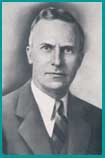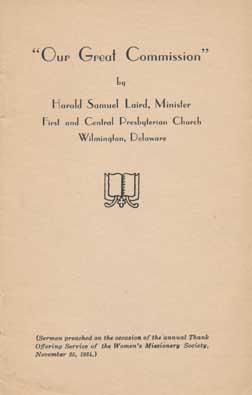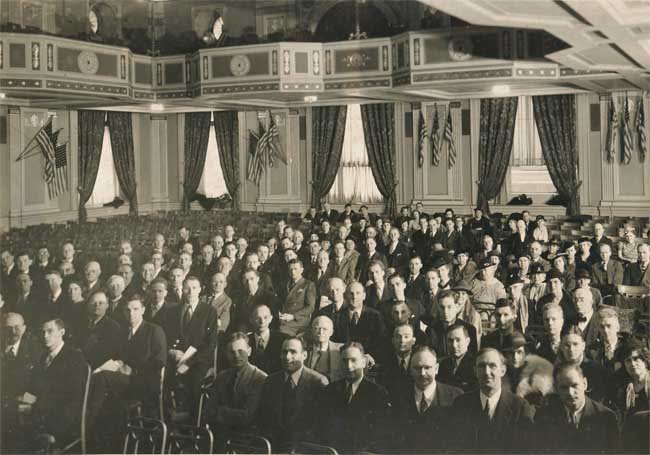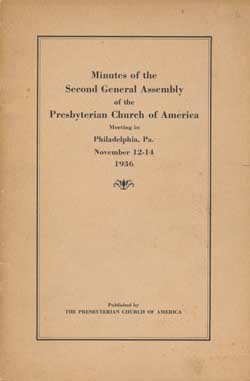 The Rev. Harold Samuel Laird was a man of great Christian character, always spoken of with the greatest respect. Forgotten now by the current generation, he was in his time a pastor among pastors and a significant leader in the conservative Presbyterian movement in the 20th century. Taking advantage of your pending holiday, we present a longer post today, a sermon by the Rev. Harold S. Laird, preached on the occasion of the annual Thank Offering service of the Women’s Missionary Society, November 25, 1934. We trust you will be edified and challenged by reading of this sermon:—
The Rev. Harold Samuel Laird was a man of great Christian character, always spoken of with the greatest respect. Forgotten now by the current generation, he was in his time a pastor among pastors and a significant leader in the conservative Presbyterian movement in the 20th century. Taking advantage of your pending holiday, we present a longer post today, a sermon by the Rev. Harold S. Laird, preached on the occasion of the annual Thank Offering service of the Women’s Missionary Society, November 25, 1934. We trust you will be edified and challenged by reading of this sermon:—
Our Great Commission
“And Jesus came and spake unto them, saying, All power is given unto me in heaven and in earth. Go ye therefore, and teach all nations, baptizing them in the name of the Father, and of the Son, and of the Holy Ghost: teaching them to observe all things whatsoever I have commanded you: and, lo, I am with you alway, even unto the end of the age. Amen.” (Matthew 28:18-20)
These three verses contain what is commonly called “The Great Commission.” On this occasion I have chosen to refer to it as “Our Great Commission,” because of the fact that we are considering it together, as a body of disciples of Him who gave the commission.
In these words I have as a pastor my justification for urging upon you as members of this church, and professed disciples of Christ, a great activity in the work of missions. More than this, in these same words we as the Session of this church have encouragement for the continuance and maintenance of our missionary effort above any other work in which we may be engaged. But still further, in these same words we as a body of professed believers in Christ find a positive obligation and duty to carry the Gospel into every corner of the world.
In order that we might the more clearly see our duty both as a church and as individual members, I ask you to consider carefully with me this Great Commission as we find it in the three verses of our text. Here there are three facts which may be clearly discerned through careful analysis of the verses—the source of the Great Commission, the object of the Great Commission, and the encouragement to those who will obey the Great Commission.
1—THE SOURCE OF THE GREAT COMMISSION
 Whence did it come? From whom and by whom was it given? I am glad that the Scripture has not left us in doubt as to this. The text declares that it was Jesus who spoke the words. The source of this commission was not Moses, nor one of the prophets, nor even the foremost missionary, Paul. God’ could have given it to the church through any one of these, for all of them “spake as they were moved by the Holy Ghost,” but He chose rather to give it through Him who “spake as never man spake,” but “as one having authority.”
Whence did it come? From whom and by whom was it given? I am glad that the Scripture has not left us in doubt as to this. The text declares that it was Jesus who spoke the words. The source of this commission was not Moses, nor one of the prophets, nor even the foremost missionary, Paul. God’ could have given it to the church through any one of these, for all of them “spake as they were moved by the Holy Ghost,” but He chose rather to give it through Him who “spake as never man spake,” but “as one having authority.”
It is tremendously significant to note that before our Lord Jesus spoke the words of the commission, He definitely claimed for Himself authority with the statement, “All authority is given unto me in heaven and in earth.” The King James Version translates it “power”, but a careful reading of the Greek makes it clear that what He was really claiming here was authority, and not power as we are familiar with the usage of the word in the New Testament.
I am reminded of the passage in Daniel which speaks of Jehovah as “he (that) doeth according to his will in the army of heaven, and among the inhabitants of the earth: and none can stay his hand, or say unto him, What doest thou?” In this passage the man of God is ascribing authority unto Him that ‘‘sitteth in the heavens. ” It is the same authority which the Lord Jesus claims for Himself as He introduces the Great Commission, saying, “All authority is given unto me in heaven and in earth.”
Because this commission came from Him who had such authority, it came as a command. He did not speak these words as a mere request, suggesting that the Church might go or not, as it pleased. He who possessed such authority was not in the habit of making requests of His subjects. When He speaks, He speaks to command, and why not? Is not this the way of kings? Let us remember that He is a King, the King and Head of His church. Surely He has the right to command the church He purchased with His own blood, and in which are numbered those who bear His name and claim thereby to be His very own.
Occasionally I find a professed Christian who declares that he has no interest in foreign missions. I question such a one’s right to call Jesus Lord. If He is Lord, we must have an interest in the things He commands. Those who make such a statement are often exceedingly zealous about attending the Sacrament of the Lord’s Supper. Let us remember that the Great Commission of our Lord is equally as much a command as is His summons to the table of His broken body aid shed blood.
Years ago it was my privilege to attend a great missionary convention in Washington, D. C. On that occasion I listened to the outstanding missionary leaders of the world. One sentence spoken by one of them has lingered with me. It was this: “The question of one’s becoming a Christian is perfectly optional. He may become a Christian or not, as he chooses, and suffer the consequences. But after that one has become a Christian, there is nothing optional about it. He is then duty-bound to be obedient to the Great Commission”.
In view of all this, the first claim of missionary activity does not therefore come from the misery and need of the world. Surely this is a mighty claim, and were you to be transported this morning from your comfortable seat in this auditorium to one of those sections of the world where the Gospel has never yet been preached, and with your own eyes behold the dire need of those who have never heard the story, you would not need further persuasion to create in your heart a missionary zeal.
I shall never forget the impression made upon the First Church of Lewistown, Pa., during my pastorate there, when during our annual School of Missions we had the privilege of hearing the testimony of Dr. L. E. Smith, a medical missionary under our Board of Foreign Missions. In connection with his address to men only he showed a series of pictures taken of patients whom he had treated, showing something of the awful physical need in a land where Christ is not known. Following the address, a man in the church came to me declaring that never could he go to Africa to do what this doctor was doing. I said to him, “If you cannot go, then certainly you ought to make it possible for those to go who will go”. To this he replied, “I know that I should, and I will.”
When I took Dr. Smith to the train, I had occasion while we were waiting on the platform to introduce him to one of the physicians of our town, and I suggested that Dr. Smith show to this man some copies of the photographs which he had used the night before at the church. As he studied the pictures and heard Dr. Smith relate some of his experiences, he declared, “What a place that would be to practice medicine”! Dr. Smith’s reply was this “No man would be willing to practice medicine in that place unless he had in his heart the love of Christ for dying men.”
But this ought not to be the first claim for your missionary activity. Neither does the first claim of missionary activity arise from the fact of the great blessing of the Gospel to those who hear and receive its truths. Were you to go into certain sections of heathen lands today, comparing Christian communities with non-Christian, you would need no other argument to convince you of the value of missionary work, or of your own obligation as a professed Christian to share in it.
In the year 1833 Charles Darwin, the famous scientist and exponent of the chief theory of evolution, paid a visit while in search of the so-called “missing link” to the South Sea Islands, then inhabited by cannibals. As he studied these people, he was convinced that they were the lowest specimen of humanity in the world, in some ways lower even than the brutes. As he came away, he declared that no power on earth could transform those people into a higher form of civilization. He was right, for no earthly power could do that. Just thirty-four years later, in 1867, Mr. Darwin returned to these same islands and found there churches, schools, and huts from which there came the sound of the singing of hymns. This was after the ministry of John G. Paton. Mr. Darwin returned to England and made out a substantial check to the London Missionary Society, sending it with the testimony that he had seen with his own eyes the power of the Gospel and wished to have some share in its remarkable ministry.
It is a significant thing that that which wrought the transformation in the South Sea Islands was not a program of education or social service, but simply the preaching of the Gospel of the crucified, risen Saviour. It is also significant that our Mission Boards do not undertake a ministry of education among such people as those to whom John G. Paton ministered. They rather carry on such programs in lands where civilization has been for generations.
Surely such blessings as those which the Gospel brings do have a mighty claim, as well as the dire need for that blessing, and these ought to transform any professed believers in Christ into a great missionary people. It is because of my conviction regarding this that we set up an annual School of Missions, where we hear the testimony from missionaries direct from the field regarding both the need and the power of the Gospel to meet that need. But as a matter of fact, evidence like this ought not to be necessary to lead us into great missionary activity. The commission itself should be sufficient.
The first claim of any church’s missionary work ought to arise from the direct command of our Lord Jesus Christ. We ought to be a missionary people not primarily because of the need of the heathen, or the power of the Gospel of the Lord Jesus Christ to meet that need, but rather first of all because He commands us to be such a people. For this reason the church that neglects foreign missions is disregarding the express orders of her Lord. It is a serious thing to do this, for consider again who He is that we dare thus to disregard. He is the One who claimed, “All authority is given unto me in heaven and in earth.”
II—THE OBJECT OF THE GREAT COMMISSION
The object is quite as clearly declared in the text as is the source of it. We as a church are to go and “make disciples of all nations, baptizing them in the name of the Father, and of the Son, and of the Holy Ghost.” From these words it is first of all clear that the church is not to sit still and wait for the heathen to come to its doors, but it is to go to them. Not only so, but it clearly sets forth that it is the duty of the church to go not to some of them only, but to all of them. We are commanded to “make disciples of all nations.’ That means all people everywhere, be they in the heart of a great continent, or in the middle of the sea upon some forsaken island.
The object of the telling of the story is clearly stated. It is not that those to whom we go may be civilized, or educated, good as these things are. We are to have a greater objective than that. We are commanded to go and make disciples. That is, we are to go with the express purpose of leading men to Christ and baptizing them in His name.
Sometimes I fear that the church is missing the clearly given object of its commission as it throws its effort and money into a program of education and social service, all of which is good, but not the object as stated in the commission. I take it to be the duty of every church that sends out missionaries to see to it that these missionaries are putting “first things first.” To the best of our ability, we have done and are doing this in our church. We are endeavoring to be as true as we know how to the great object of our Lord’s commission, which is to make disciples of all nations, that is, to lead men and women everywhere to a knowledge of Jesus Christ as personal Saviour and Lord.
III—THE ENCOURAGEMENT GIVEN TO OBEDIENCE
This encouragement comes to us as a mighty promise conditioned only upon our obedience. This great promise follows immediately upon our Lord’s command—“lo, I am with you alway, even unto the end of the age.” Sometimes this verse is detached from the preceding verses. Frequently I have heard it used by those who claimed the Lord’s abiding presence regardless of their attitude towards the Great Commission. I am sure that we have no right to separate this promise from the command which it immediately follows. Let us remember that these verses were spoken together by our Lord and that they should always go together. The fulfillment of the one is conditioned by the obedience of the other. It is only when we go that we may claim the promise.
Consider carefully the force of the little word, “Lo.” “Go ye,” says our Lord, “and, lo, I am with you.” It is used to arrest attention and summons us to the consideration of a marvelous truth, namely, the promise of His presence. Not only so, but of His continuous presence—“alway”, every day, every hour, every moment. What a promise, and what encouragement! What a mighty incentive this ought to be to us as a church to go!
The church that does not go has no right to expect His presence and all that presence means in its life and work. Let me say that the church that does not go does not have His presence. It is the church that goes, the church that has a great missionary passion, and a large missionary activity that has His presence and His consequent blessing. This is why I am so eager that this church shall be a great missionary church— because I KNOW that if we obey and go, He will be with us to bless us, even He who has all power in heaven and in earth, as well as all authority.
The best way for any church to know the richest blessing of heaven is for that church to become missionary-minded. I think a year ago today I called attention to the striking testimony of Phillips Brooks, who early in his ministry made the statement that if ever he were called to serve a church that was financially run-down and unable to meet its bills, he would at once urge that church to undertake the support of a foreign missionary. Such a statement sounds like the height of folly to the unbelieving world, but those of us who have tested this promise of the Lord know that this course is not folly but the very height of wisdom.
That which is true of the church is true also of the individual in the church, for what our Lord Jesus says to the church, He says also to you and to me. “Go ye”…if you go… “Lo, I am with you.” Remember, when He is with us, in the sense of this promise, His presence always brings blessing. It was so in the days of His sojourn in the flesh. As it was then, so it is now, for He is “the same yester-day, and today, and forever.” Do you want that Presence and the blessing it guarantees? If you do, obey the Great Commission. “Go ye”!




